1, Mybatis overall execution process
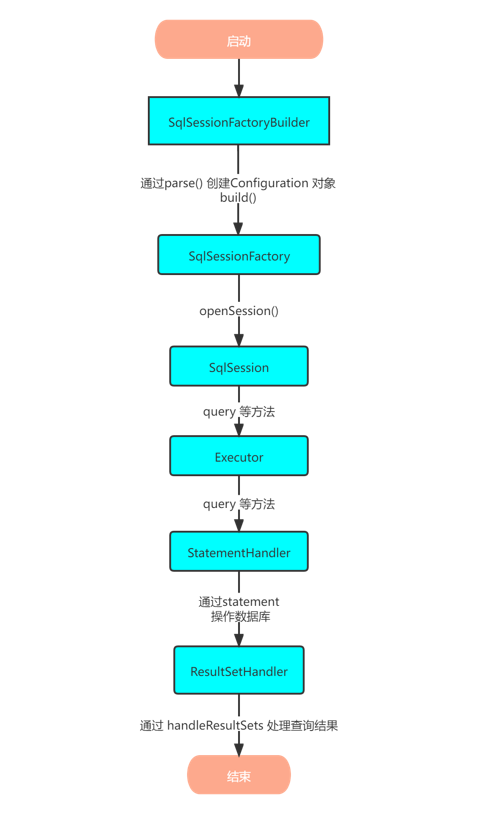
2, Mybatis specific process source code analysis
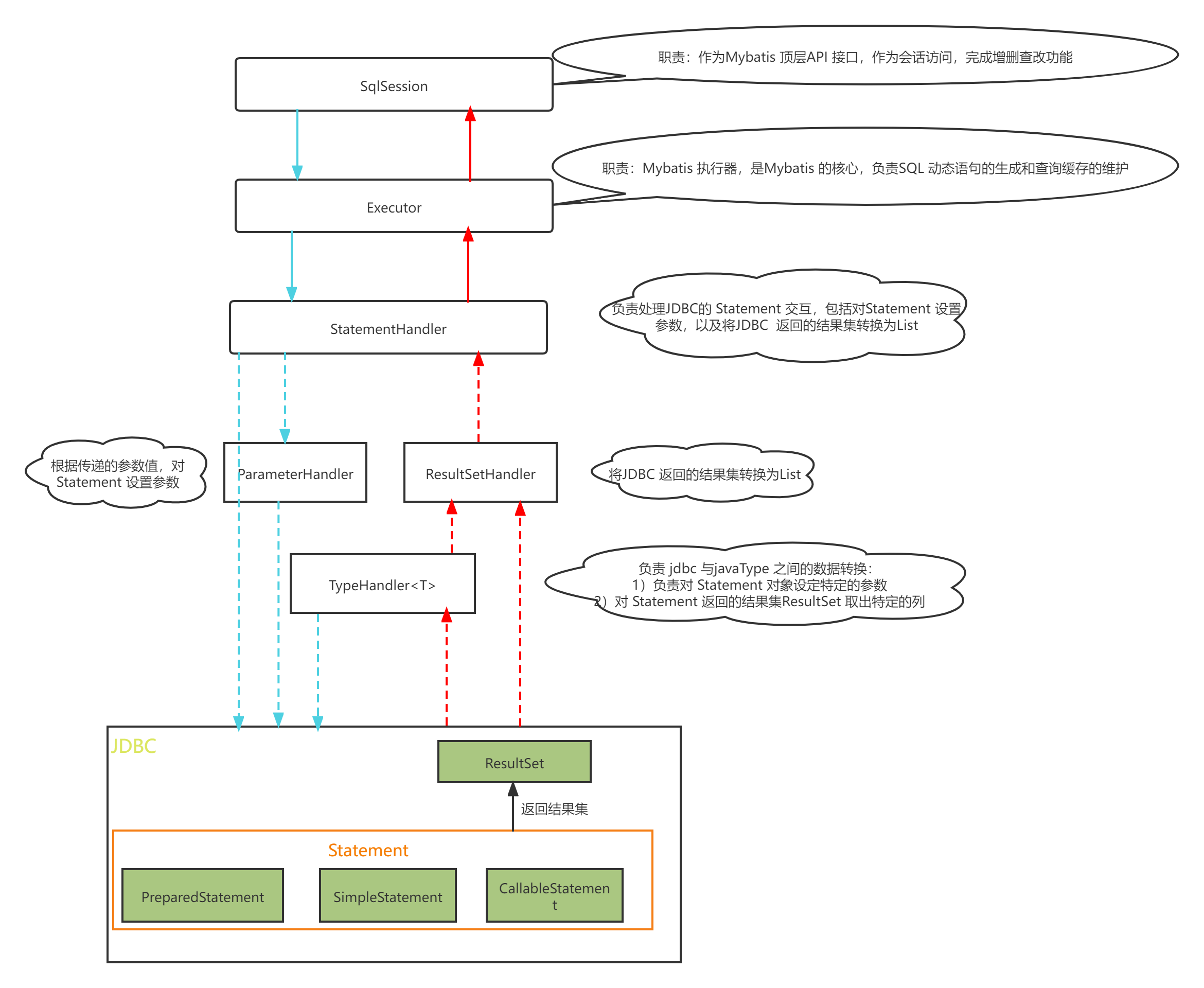
3, Source code analysis
Write a test class to specifically analyze the execution process of Mybatis:
public class MybatisTest {
public static void main(String[] args) throws IOException {
//1. Read mybatis config XML file
InputStream inputStream = Resources.getResourceAsStream("mybatis-config.xml");
//2. Build sqlsessionfactory (defaultsqlsessionfactory is created)
SqlSessionFactory sqlSessionFactory = new SqlSessionFactoryBuilder().build(inputStream);
//3. Open SqlSession
SqlSession sqlSession = sqlSessionFactory.openSession();
//4. Get Mapper interface object
UserMapper mapper = sqlSession.getMapper(UserMapper.class);
//5. Get the method of mapper interface object and operate the database
List<SysUser> sysUsers = mapper.selectByIdList(Arrays.asList(1L));
System.out.println("The query result is:" + sysUsers.size());
}
}
1. View xmlconfigbuilder parse() :
Trace new sqlsessionfactorybuilder() build(inputStream); View xmlconfigbuilder parse() :
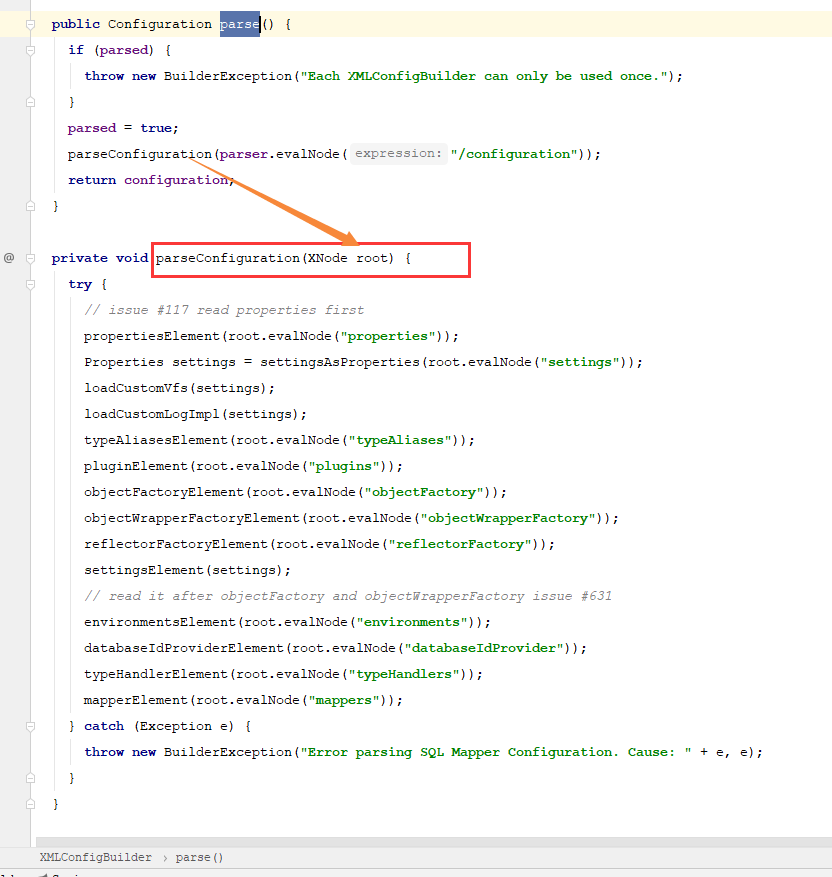
1.1 propertiesElement
private void propertiesElement(XNode context) throws Exception {
if (context != null) {
Properties defaults = context.getChildrenAsProperties();
String resource = context.getStringAttribute("resource");
String url = context.getStringAttribute("url");
if (resource != null && url != null) {
throw new BuilderException("The properties element cannot specify both a URL and a resource based property file reference. Please specify one or the other.");
}
if (resource != null) {
defaults.putAll(Resources.getResourceAsProperties(resource));
} else if (url != null) {
defaults.putAll(Resources.getUrlAsProperties(url));
}
Properties vars = configuration.getVariables();
if (vars != null) {
defaults.putAll(vars);
}
parser.setVariables(defaults);
configuration.setVariables(defaults);
}
}
1.2 settingsAsProperties
private Properties settingsAsProperties(XNode context) {
if (context == null) {
return new Properties();
}
Properties props = context.getChildrenAsProperties();
// Check that all settings are known to the configuration class
MetaClass metaConfig = MetaClass.forClass(Configuration.class, localReflectorFactory);
for (Object key : props.keySet()) {
if (!metaConfig.hasSetter(String.valueOf(key))) {
throw new BuilderException("The setting " + key + " is not known. Make sure you spelled it correctly (case sensitive).");
}
}
return props;
}
1.3 typeAliasesElement
private void typeAliasesElement(XNode parent) {
if (parent != null) {
for (XNode child : parent.getChildren()) {
if ("package".equals(child.getName())) {
String typeAliasPackage = child.getStringAttribute("name");
configuration.getTypeAliasRegistry().registerAliases(typeAliasPackage);
} else {
String alias = child.getStringAttribute("alias");
String type = child.getStringAttribute("type");
try {
Class<?> clazz = Resources.classForName(type);
if (alias == null) {
typeAliasRegistry.registerAlias(clazz);
} else {
typeAliasRegistry.registerAlias(alias, clazz);
}
} catch (ClassNotFoundException e) {
throw new BuilderException("Error registering typeAlias for '" + alias + "'. Cause: " + e, e);
}
}
}
}
}
1.4 pluginElement
private void pluginElement(XNode parent) throws Exception {
if (parent != null) {
for (XNode child : parent.getChildren()) {
String interceptor = child.getStringAttribute("interceptor");
Properties properties = child.getChildrenAsProperties();
Interceptor interceptorInstance = (Interceptor) resolveClass(interceptor).getDeclaredConstructor().newInstance();
interceptorInstance.setProperties(properties);
configuration.addInterceptor(interceptorInstance);
}
}
}
#####1.5 objectFactoryElement
private void objectFactoryElement(XNode context) throws Exception {
if (context != null) {
String type = context.getStringAttribute("type");
Properties properties = context.getChildrenAsProperties();
ObjectFactory factory = (ObjectFactory) resolveClass(type).getDeclaredConstructor().newInstance();
factory.setProperties(properties);
configuration.setObjectFactory(factory);
}
}
1.6 objectWrapperFactoryElement
private void objectWrapperFactoryElement(XNode context) throws Exception {
if (context != null) {
String type = context.getStringAttribute("type");
ObjectWrapperFactory factory = (ObjectWrapperFactory) resolveClass(type).getDeclaredConstructor().newInstance();
configuration.setObjectWrapperFactory(factory);
}
}
1.7 reflectorFactoryElement
private void reflectorFactoryElement(XNode context) throws Exception {
if (context != null) {
String type = context.getStringAttribute("type");
ReflectorFactory factory = (ReflectorFactory) resolveClass(type).getDeclaredConstructor().newInstance();
configuration.setReflectorFactory(factory);
}
}
1.8 settingsElement
private void settingsElement(Properties props) {
configuration.setAutoMappingBehavior(AutoMappingBehavior.valueOf(props.getProperty("autoMappingBehavior", "PARTIAL")));
configuration.setAutoMappingUnknownColumnBehavior(AutoMappingUnknownColumnBehavior.valueOf(props.getProperty("autoMappingUnknownColumnBehavior", "NONE")));
configuration.setCacheEnabled(booleanValueOf(props.getProperty("cacheEnabled"), true));
configuration.setProxyFactory((ProxyFactory) createInstance(props.getProperty("proxyFactory")));
configuration.setLazyLoadingEnabled(booleanValueOf(props.getProperty("lazyLoadingEnabled"), false));
configuration.setAggressiveLazyLoading(booleanValueOf(props.getProperty("aggressiveLazyLoading"), false));
configuration.setMultipleResultSetsEnabled(booleanValueOf(props.getProperty("multipleResultSetsEnabled"), true));
configuration.setUseColumnLabel(booleanValueOf(props.getProperty("useColumnLabel"), true));
configuration.setUseGeneratedKeys(booleanValueOf(props.getProperty("useGeneratedKeys"), false));
configuration.setDefaultExecutorType(ExecutorType.valueOf(props.getProperty("defaultExecutorType", "SIMPLE")));
configuration.setDefaultStatementTimeout(integerValueOf(props.getProperty("defaultStatementTimeout"), null));
configuration.setDefaultFetchSize(integerValueOf(props.getProperty("defaultFetchSize"), null));
configuration.setDefaultResultSetType(resolveResultSetType(props.getProperty("defaultResultSetType")));
configuration.setMapUnderscoreToCamelCase(booleanValueOf(props.getProperty("mapUnderscoreToCamelCase"), false));
configuration.setSafeRowBoundsEnabled(booleanValueOf(props.getProperty("safeRowBoundsEnabled"), false));
configuration.setLocalCacheScope(LocalCacheScope.valueOf(props.getProperty("localCacheScope", "SESSION")));
configuration.setJdbcTypeForNull(JdbcType.valueOf(props.getProperty("jdbcTypeForNull", "OTHER")));
configuration.setLazyLoadTriggerMethods(stringSetValueOf(props.getProperty("lazyLoadTriggerMethods"), "equals,clone,hashCode,toString"));
configuration.setSafeResultHandlerEnabled(booleanValueOf(props.getProperty("safeResultHandlerEnabled"), true));
configuration.setDefaultScriptingLanguage(resolveClass(props.getProperty("defaultScriptingLanguage")));
configuration.setDefaultEnumTypeHandler(resolveClass(props.getProperty("defaultEnumTypeHandler")));
configuration.setCallSettersOnNulls(booleanValueOf(props.getProperty("callSettersOnNulls"), false));
configuration.setUseActualParamName(booleanValueOf(props.getProperty("useActualParamName"), true));
configuration.setReturnInstanceForEmptyRow(booleanValueOf(props.getProperty("returnInstanceForEmptyRow"), false));
configuration.setLogPrefix(props.getProperty("logPrefix"));
configuration.setConfigurationFactory(resolveClass(props.getProperty("configurationFactory")));
configuration.setShrinkWhitespacesInSql(booleanValueOf(props.getProperty("shrinkWhitespacesInSql"), false));
configuration.setDefaultSqlProviderType(resolveClass(props.getProperty("defaultSqlProviderType")));
}
1.9 environmentsElement
private void environmentsElement(XNode context) throws Exception {
if (context != null) {
if (environment == null) {
environment = context.getStringAttribute("default");
}
for (XNode child : context.getChildren()) {
String id = child.getStringAttribute("id");
if (isSpecifiedEnvironment(id)) {
TransactionFactory txFactory = transactionManagerElement(child.evalNode("transactionManager"));
DataSourceFactory dsFactory = dataSourceElement(child.evalNode("dataSource"));
DataSource dataSource = dsFactory.getDataSource();
Environment.Builder environmentBuilder = new Environment.Builder(id)
.transactionFactory(txFactory)
.dataSource(dataSource);
configuration.setEnvironment(environmentBuilder.build());
break;
}
}
}
}
1.10 databaseIdProviderElement
private void databaseIdProviderElement(XNode context) throws Exception {
DatabaseIdProvider databaseIdProvider = null;
if (context != null) {
String type = context.getStringAttribute("type");
// awful patch to keep backward compatibility
if ("VENDOR".equals(type)) {
type = "DB_VENDOR";
}
Properties properties = context.getChildrenAsProperties();
databaseIdProvider = (DatabaseIdProvider) resolveClass(type).getDeclaredConstructor().newInstance();
databaseIdProvider.setProperties(properties);
}
Environment environment = configuration.getEnvironment();
if (environment != null && databaseIdProvider != null) {
String databaseId = databaseIdProvider.getDatabaseId(environment.getDataSource());
configuration.setDatabaseId(databaseId);
}
}
1.11 typeHandlerElement
private void typeHandlerElement(XNode parent) {
if (parent != null) {
for (XNode child : parent.getChildren()) {
if ("package".equals(child.getName())) {
String typeHandlerPackage = child.getStringAttribute("name");
typeHandlerRegistry.register(typeHandlerPackage);
} else {
String javaTypeName = child.getStringAttribute("javaType");
String jdbcTypeName = child.getStringAttribute("jdbcType");
String handlerTypeName = child.getStringAttribute("handler");
Class<?> javaTypeClass = resolveClass(javaTypeName);
JdbcType jdbcType = resolveJdbcType(jdbcTypeName);
Class<?> typeHandlerClass = resolveClass(handlerTypeName);
if (javaTypeClass != null) {
if (jdbcType == null) {
typeHandlerRegistry.register(javaTypeClass, typeHandlerClass);
} else {
typeHandlerRegistry.register(javaTypeClass, jdbcType, typeHandlerClass);
}
} else {
typeHandlerRegistry.register(typeHandlerClass);
}
}
}
}
}
1.12 mapperElement
private void mapperElement(XNode parent) throws Exception {
if (parent != null) {
for (XNode child : parent.getChildren()) {
if ("package".equals(child.getName())) {
String mapperPackage = child.getStringAttribute("name");
configuration.addMappers(mapperPackage);
} else {
String resource = child.getStringAttribute("resource");
String url = child.getStringAttribute("url");
String mapperClass = child.getStringAttribute("class");
if (resource != null && url == null && mapperClass == null) {
ErrorContext.instance().resource(resource);
try(InputStream inputStream = Resources.getResourceAsStream(resource)) {
XMLMapperBuilder mapperParser = new XMLMapperBuilder(inputStream, configuration, resource, configuration.getSqlFragments());
mapperParser.parse();
}
} else if (resource == null && url != null && mapperClass == null) {
ErrorContext.instance().resource(url);
try(InputStream inputStream = Resources.getUrlAsStream(url)){
XMLMapperBuilder mapperParser = new XMLMapperBuilder(inputStream, configuration, url, configuration.getSqlFragments());
mapperParser.parse();
}
} else if (resource == null && url == null && mapperClass != null) {
Class<?> mapperInterface = Resources.classForName(mapperClass);
configuration.addMapper(mapperInterface);
} else {
throw new BuilderException("A mapper element may only specify a url, resource or class, but not more than one.");
}
}
}
}
}
2. Get a SqlSession: sqlsessionfactory openSession();
Trace sqlsession sqlsession = sqlsessionfactory openSession();
@Override
public SqlSession openSession() {
return openSessionFromDataSource(configuration.getDefaultExecutorType(), null, false);
}
private SqlSession openSessionFromDataSource(ExecutorType execType, TransactionIsolationLevel level, boolean autoCommit) {
Transaction tx = null;
try {
final Environment environment = configuration.getEnvironment();
final TransactionFactory transactionFactory = getTransactionFactoryFromEnvironment(environment);
tx = transactionFactory.newTransaction(environment.getDataSource(), level, autoCommit);
//Enter view
final Executor executor = configuration.newExecutor(tx, execType);
return new DefaultSqlSession(configuration, executor, autoCommit);
} catch (Exception e) {
closeTransaction(tx); // may have fetched a connection so lets call close()
throw ExceptionFactory.wrapException("Error opening session. Cause: " + e, e);
} finally {
ErrorContext.instance().reset();
}
}
public Executor newExecutor(Transaction transaction, ExecutorType executorType) {
executorType = executorType == null ? defaultExecutorType : executorType;
//If defaultExecutorType is empty, it is: executortype SIMPLE
executorType = executorType == null ? ExecutorType.SIMPLE : executorType;
Executor executor;
if (ExecutorType.BATCH == executorType) {
executor = new BatchExecutor(this, transaction);
} else if (ExecutorType.REUSE == executorType) {
executor = new ReuseExecutor(this, transaction);
} else {
executor = new SimpleExecutor(this, transaction);
}
if (cacheEnabled) {
executor = new CachingExecutor(executor);
}
executor = (Executor) interceptorChain.pluginAll(executor);
return executor;
}
There are three types of ExecutorType:
- SIMPLE
- REUSE
- BATCH
For detailed explanation, refer to: ExecutorType in Mybatis
The brief summary is as follows: - Simpleexecution is a kind of regular executor. A statement will be created for each execution and closed after use.
- Reuseexector is a reusable executor that stores statements in a map and operates on the statements in the map without creating statements repeatedly.
- BatchExecutor is a batch executor. It is a doUpdate preprocessing stored procedure or batch operation. doQuery submits and executes the procedure.
3. View sqlsession getMapper(UserMapper.class);
public class MapperRegistry {
private final Configuration config;
private final Map<Class<?>, MapperProxyFactory<?>> knownMappers = new HashMap<>();
public MapperRegistry(Configuration config) {
this.config = config;
}
@SuppressWarnings("unchecked")
public <T> T getMapper(Class<T> type, SqlSession sqlSession) {
final MapperProxyFactory<T> mapperProxyFactory = (MapperProxyFactory<T>) knownMappers.get(type);
if (mapperProxyFactory == null) {
throw new BindingException("Type " + type + " is not known to the MapperRegistry.");
}
try {
//If not, create an instance using the factory pattern
return mapperProxyFactory.newInstance(sqlSession);
} catch (Exception e) {
throw new BindingException("Error getting mapper instance. Cause: " + e, e);
}
}
//...
}
public class MapperProxyFactory<T> {
private final Class<T> mapperInterface;
private final Map<Method, MapperMethodInvoker> methodCache = new ConcurrentHashMap<>();
public MapperProxyFactory(Class<T> mapperInterface) {
this.mapperInterface = mapperInterface;
}
//...
public T newInstance(SqlSession sqlSession) {
//Using the factory pattern, create a proxy: MapperProxy
final MapperProxy<T> mapperProxy = new MapperProxy<>(sqlSession, mapperInterface, methodCache);
return newInstance(mapperProxy);
}
}
//agent
public class MapperProxy<T> implements InvocationHandler, Serializable {
//After the proxy, the invoke method will be called when all mapper methods are called
@Override
public Object invoke(Object proxy, Method method, Object[] args) throws Throwable {
try {
//Except for the methods in the Object class (toString, hashCode...)
if (Object.class.equals(method.getDeclaringClass())) {
return method.invoke(this, args);
} else {
return cachedInvoker(method).invoke(proxy, method, args, sqlSession);
}
} catch (Throwable t) {
throw ExceptionUtil.unwrapThrowable(t);
}
}
}
//...
interface MapperMethodInvoker {
Object invoke(Object proxy, Method method, Object[] args, SqlSession sqlSession) throws Throwable;
}
private static class PlainMethodInvoker implements MapperMethodInvoker {
private final MapperMethod mapperMethod;
public PlainMethodInvoker(MapperMethod mapperMethod) {
super();
this.mapperMethod = mapperMethod;
}
//Specific implementation
@Override
public Object invoke(Object proxy, Method method, Object[] args, SqlSession sqlSession) throws Throwable {
return mapperMethod.execute(sqlSession, args);
}
}
// Execute specific methods by operation type
public Object execute(SqlSession sqlSession, Object[] args) {
Object result;
//There are five cases: insert, update, delete, select and flush. Call the five major methods of SQLSession respectively, and throw BindingException in other cases
switch (command.getType()) {
case INSERT: {
Object param = method.convertArgsToSqlCommandParam(args);
result = rowCountResult(sqlSession.insert(command.getName(), param));
break;
}
case UPDATE: {
Object param = method.convertArgsToSqlCommandParam(args);
result = rowCountResult(sqlSession.update(command.getName(), param));
break;
}
case DELETE: {
Object param = method.convertArgsToSqlCommandParam(args);
result = rowCountResult(sqlSession.delete(command.getName(), param));
break;
}
case SELECT:
if (method.returnsVoid() && method.hasResultHandler()) {
executeWithResultHandler(sqlSession, args);
result = null;
} else if (method.returnsMany()) {
//Follow here
result = executeForMany(sqlSession, args);
} else if (method.returnsMap()) {
result = executeForMap(sqlSession, args);
} else if (method.returnsCursor()) {
result = executeForCursor(sqlSession, args);
} else {
Object param = method.convertArgsToSqlCommandParam(args);
result = sqlSession.selectOne(command.getName(), param);
if (method.returnsOptional()
&& (result == null || !method.getReturnType().equals(result.getClass()))) {
result = Optional.ofNullable(result);
}
}
break;
case FLUSH:
result = sqlSession.flushStatements();
break;
default:
throw new BindingException("Unknown execution method for: " + command.getName());
}
if (result == null && method.getReturnType().isPrimitive() && !method.returnsVoid()) {
throw new BindingException("Mapper method '" + command.getName()
+ " attempted to return null from a method with a primitive return type (" + method.getReturnType() + ").");
}
return result;
}
4. Execute query selectList
//Query multiple data
//org.apache.ibatis.binding.MapperMethod#executeForMany
private <E> Object executeForMany(SqlSession sqlSession, Object[] args) {
List<E> result;
Object param = method.convertArgsToSqlCommandParam(args);
if (method.hasRowBounds()) {
RowBounds rowBounds = method.extractRowBounds(args);
result = sqlSession.selectList(command.getName(), param, rowBounds);
} else {
result = sqlSession.selectList(command.getName(), param);
}
// issue #510 Collections & arrays support
if (!method.getReturnType().isAssignableFrom(result.getClass())) {
if (method.getReturnType().isArray()) {
return convertToArray(result);
} else {
return convertToDeclaredCollection(sqlSession.getConfiguration(), result);
}
}
return result;
}
//View sqlsession selectList
// org.apache.ibatis.session.defaults.DefaultSqlSession#selectList(String statement, Object parameter, RowBounds rowBounds, ResultHandler handler)
private <E> List<E> selectList(String statement, Object parameter, RowBounds rowBounds, ResultHandler handler) {
try {
MappedStatement ms = configuration.getMappedStatement(statement);
return executor.query(ms, wrapCollection(parameter), rowBounds, handler);
} catch (Exception e) {
throw ExceptionFactory.wrapException("Error querying database. Cause: " + e, e);
} finally {
ErrorContext.instance().reset();
}
}
// View executor query()
//BaseExecutor.query(MappedStatement ms, Object parameter, RowBounds rowBounds, ResultHandler resultHandler)
@Override
public <E> List<E> query(MappedStatement ms, Object parameter, RowBounds rowBounds, ResultHandler resultHandler) throws SQLException {
BoundSql boundSql = ms.getBoundSql(parameter);
CacheKey key = createCacheKey(ms, parameter, rowBounds, boundSql);
return query(ms, parameter, rowBounds, resultHandler, key, boundSql);// Enter view
}
@SuppressWarnings("unchecked")
@Override
public <E> List<E> query(MappedStatement ms, Object parameter, RowBounds rowBounds, ResultHandler resultHandler, CacheKey key, BoundSql boundSql) throws SQLException {
ErrorContext.instance().resource(ms.getResource()).activity("executing a query").object(ms.getId());
if (closed) {
throw new ExecutorException("Executor was closed.");
}
if (queryStack == 0 && ms.isFlushCacheRequired()) {
clearLocalCache();
}
List<E> list;
try {
queryStack++;
list = resultHandler == null ? (List<E>) localCache.getObject(key) : null;
if (list != null) {
handleLocallyCachedOutputParameters(ms, key, parameter, boundSql);
} else {
list = queryFromDatabase(ms, parameter, rowBounds, resultHandler, key, boundSql);//Enter view
}
} finally {
queryStack--;
}
if (queryStack == 0) {
for (DeferredLoad deferredLoad : deferredLoads) {
deferredLoad.load();
}
// issue #601
deferredLoads.clear();
if (configuration.getLocalCacheScope() == LocalCacheScope.STATEMENT) {
// issue #482
clearLocalCache();
}
}
return list;
}
private <E> List<E> queryFromDatabase(MappedStatement ms, Object parameter, RowBounds rowBounds, ResultHandler resultHandler, CacheKey key, BoundSql boundSql) throws SQLException {
List<E> list;
localCache.putObject(key, EXECUTION_PLACEHOLDER);
try {
list = doQuery(ms, parameter, rowBounds, resultHandler, boundSql);//Enter view
} finally {
localCache.removeObject(key);
}
localCache.putObject(key, list);
if (ms.getStatementType() == StatementType.CALLABLE) {
localOutputParameterCache.putObject(key, parameter);
}
return list;
}
// SimpleExecutor#doQuery
@Override
public <E> List<E> doQuery(MappedStatement ms, Object parameter, RowBounds rowBounds, ResultHandler resultHandler, BoundSql boundSql) throws SQLException {
Statement stmt = null;
try {
Configuration configuration = ms.getConfiguration();
StatementHandler handler = configuration.newStatementHandler(wrapper, ms, parameter, rowBounds, resultHandler, boundSql);//① Enter view
stmt = prepareStatement(handler, ms.getStatementLog());
return handler.query(stmt, resultHandler);//② Enter view
} finally {
closeStatement(stmt);
}
}
//① Configuration#newStatementHandler
public StatementHandler newStatementHandler(Executor executor, MappedStatement mappedStatement, Object parameterObject, RowBounds rowBounds, ResultHandler resultHandler, BoundSql boundSql) {
StatementHandler statementHandler = new RoutingStatementHandler(executor, mappedStatement, parameterObject, rowBounds, resultHandler, boundSql);
//Plug in here
statementHandler = (StatementHandler) interceptorChain.pluginAll(statementHandler);
return statementHandler;
}
//② SimpleStatementHandler#query
@Override
public <E> List<E> query(Statement statement, ResultHandler resultHandler) throws SQLException {
String sql = boundSql.getSql();
statement.execute(sql);
return resultSetHandler.handleResultSets(statement);//Enter view
}
5. Processing result set
// DefaultResultSetHandler#handleResultSets
@Override
public List<Object> handleResultSets(Statement stmt) throws SQLException {
ErrorContext.instance().activity("handling results").object(mappedStatement.getId());
final List<Object> multipleResults = new ArrayList<>();
int resultSetCount = 0;
ResultSetWrapper rsw = getFirstResultSet(stmt);
List<ResultMap> resultMaps = mappedStatement.getResultMaps();
int resultMapCount = resultMaps.size();
validateResultMapsCount(rsw, resultMapCount);
while (rsw != null && resultMapCount > resultSetCount) {
ResultMap resultMap = resultMaps.get(resultSetCount);
handleResultSet(rsw, resultMap, multipleResults, null); //Enter view
rsw = getNextResultSet(stmt);
cleanUpAfterHandlingResultSet();
resultSetCount++;
}
String[] resultSets = mappedStatement.getResultSets();
if (resultSets != null) {
while (rsw != null && resultSetCount < resultSets.length) {
ResultMapping parentMapping = nextResultMaps.get(resultSets[resultSetCount]);
if (parentMapping != null) {
String nestedResultMapId = parentMapping.getNestedResultMapId();
ResultMap resultMap = configuration.getResultMap(nestedResultMapId);
handleResultSet(rsw, resultMap, null, parentMapping);
}
rsw = getNextResultSet(stmt);
cleanUpAfterHandlingResultSet();
resultSetCount++;
}
}
return collapseSingleResultList(multipleResults);
}
private void handleResultSet(ResultSetWrapper rsw, ResultMap resultMap, List<Object> multipleResults, ResultMapping parentMapping) throws SQLException {
try {
if (parentMapping != null) {
handleRowValues(rsw, resultMap, null, RowBounds.DEFAULT, parentMapping);
} else {
if (resultHandler == null) {
DefaultResultHandler defaultResultHandler = new DefaultResultHandler(objectFactory);
handleRowValues(rsw, resultMap, defaultResultHandler, rowBounds, null);//Enter view
multipleResults.add(defaultResultHandler.getResultList());
} else {
handleRowValues(rsw, resultMap, resultHandler, rowBounds, null);
}
}
} finally {
// issue #228 (close resultsets)
closeResultSet(rsw.getResultSet());
}
}
// DefaultResultSetHandler#handleRowValues
public void handleRowValues(ResultSetWrapper rsw, ResultMap resultMap, ResultHandler<?> resultHandler, RowBounds rowBounds, ResultMapping parentMapping) throws SQLException {
if (resultMap.hasNestedResultMaps()) {
ensureNoRowBounds();
checkResultHandler();
handleRowValuesForNestedResultMap(rsw, resultMap, resultHandler, rowBounds, parentMapping);
} else {
handleRowValuesForSimpleResultMap(rsw, resultMap, resultHandler, rowBounds, parentMapping);
}
}
//The simple result Map is processed
private void handleRowValuesForSimpleResultMap(ResultSetWrapper rsw, ResultMap resultMap, ResultHandler<?> resultHandler, RowBounds rowBounds, ResultMapping parentMapping)
throws SQLException {
DefaultResultContext<Object> resultContext = new DefaultResultContext<>();
ResultSet resultSet = rsw.getResultSet();
skipRows(resultSet, rowBounds);
while (shouldProcessMoreRows(resultContext, rowBounds) && !resultSet.isClosed() && resultSet.next()) {
ResultMap discriminatedResultMap = resolveDiscriminatedResultMap(resultSet, resultMap, null);
Object rowValue = getRowValue(rsw, discriminatedResultMap, null);
storeObject(resultHandler, resultContext, rowValue, parentMapping, resultSet);
}
}
3, Mybatis core components
| Component name | function |
|---|---|
| Configuration | All Configuration information of Mybatis is maintained in the Configuration object |
| SqlSession | As the main top-level API of Mybatis, it represents the session interacting with the database and completes the function of database addition, deletion, query and modification |
| Executor | Mybatis executor is the core of mybatis scheduling and is responsible for SQL |
| StatementHandler | Encapsulates the JDBC Statement operation, which is responsible for the operation of JDBC Statement, such as setting parameters and converting the Statement result set into a List set |
| ParameterHandler | It is responsible for converting the parameters passed by the user into the parameters required by JDBC Statement |
| ResultSetHandler | It is responsible for converting the ResultSet result set object returned by JDBC to a List type collection |
| MappedStatement | MappedStatement maintains a < select |
| MapperProxy,MapperProxyFactory | Mapper Proxy uses the native Proxy to execute the methods in mapper |
4, Design patterns used by Mybatis
Builder mode: SQLSessionFactoryBuilder, Environment
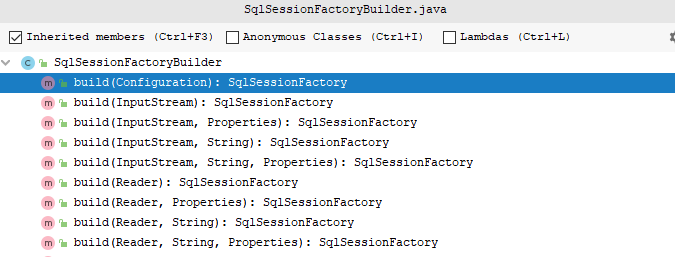
During the initialization of Mybatis environment, SqlSessionFactoryBuilder will call XMLConfigBuilder to read Mybatis config XML and all * mapper XML file, build the Mybatis core object Configuration, and then use the Configuration object as a parameter to build a SqlSessionFactory.
In this process, the Builder will read the file or configuration, and then do the steps of XPath parser parsing, configuration or syntax parsing, reflecting the generated object, storing the result cache, etc. so much work can not be included in a constructor, so the Builder mode is widely used to solve it.
Factory mode: SqlSessionFactory, TransactionFactory, LogFactory
The simple factory pattern is used in Mybatis because there is no complex business logic.
The creation process of SqlSession, the core interface for executing sql statements, obtaining Mappers and managing transactions in Mybatis, uses the factory mode. A SqlSessionFactory is responsible for the creation of SqlSession.
Singleton mode: ErrorContext, LogFactory
Proxy mode: the core of Mybatis implementation, such as MapperProxy and ConnectionLogger
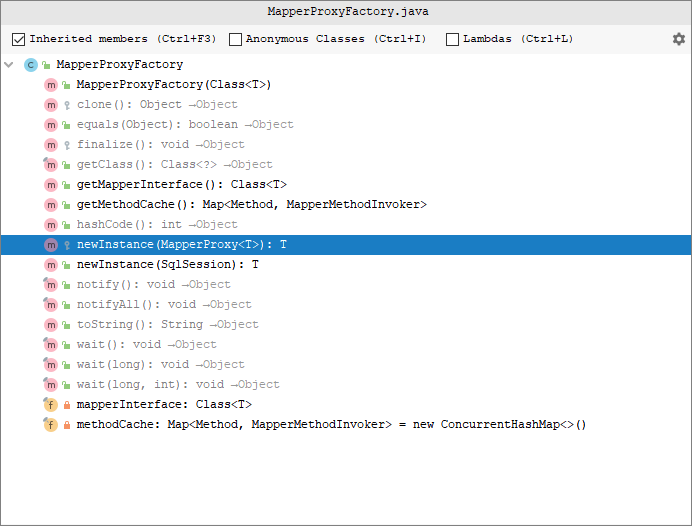
The proxy mode can be regarded as the core usage mode of Mybatis. Due to this mode, we only need to write Mapper interface without implementation. The Mybatis background helps us complete the specific SQL execution.
Mapperregistry is called when we use the getMapper method of Configuration getMapper method, which in turn calls mapperproxyfactory Newinstance (sqlsession) to generate a specific agent.
Template method patterns: BaseExecutor, simpleexector, BaseTypeHandler, and their subclasses
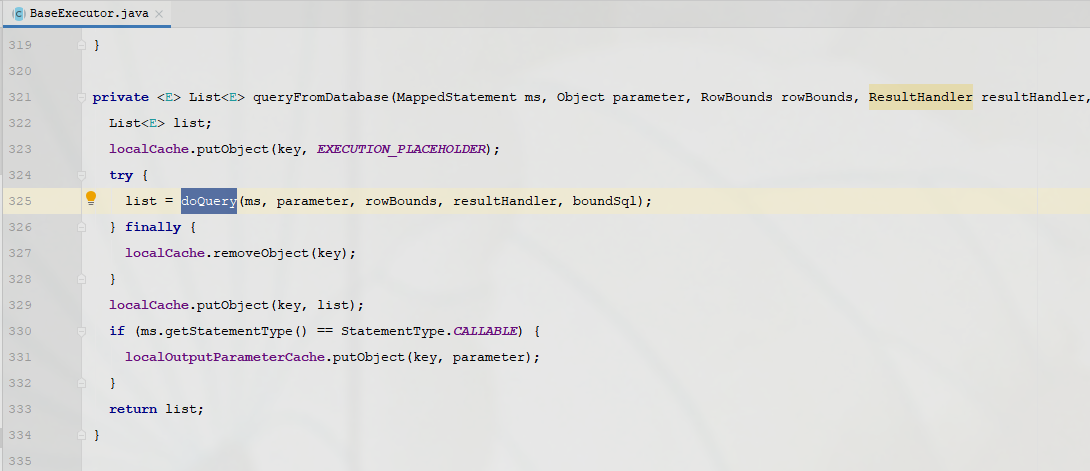


Adapter mode: Mybatis interface of Log and its connection to jdbc and log4j
5, Conclusion
Share here, thank you for reading in your busy schedule~
